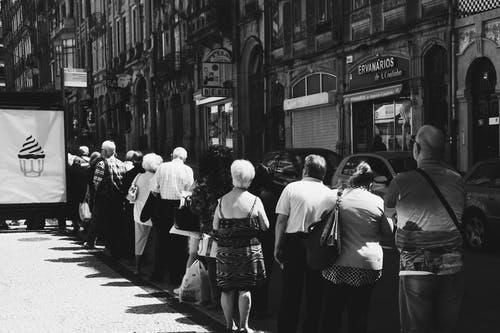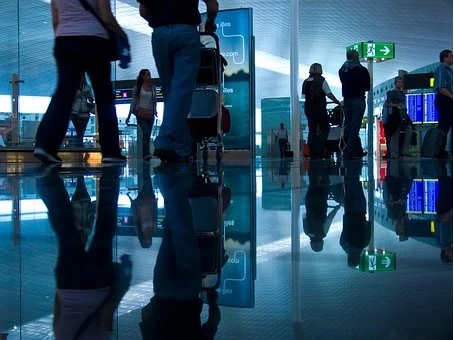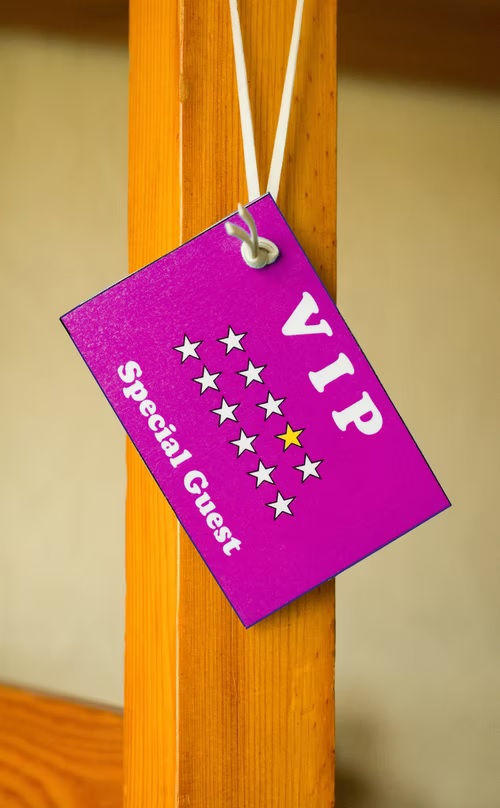
“O my dear parishioners, let us endeavour to get to heaven! There we shall see God. How happy we shall feel! If the parish is converted we shall go there in procession with the parish priest at the head…We must get to heaven!” (St. Jean Vianney). 
Lining up is more than just civility and good manners, it is a craft, even a social virtue in itself, developed and perfected over centuries.
Catholics are the masters par excellence of the art of queuing. They queue qua Catholics orderly, calmly and cheerfully, without pushing or quarrelling, and always willing to form queues.
The queue exhibits self-control, temperance being one of the four cardinal virtues, even leadership in one, orderliness and protocol. One has to wonder if that gentle skill, sign of gentility and civility, was fundamental in building the Christian civilization, and Christendom, one step at a time.
From the very beginning, Catholic iconography has shown and modelled the paradigm of lining up. There are millions and millions of depictions of saints all lined up in Heaven, as well as choirs of angels in frescoes, religious books, holy cards, altarpieces, church and cathedral facades, tombs, etc. Even musically, the glorious hymn Te Deum offers a great example of saints orderly processing and lining up.
Catholic gentlemen, as heirs of great traditions and custodians of the tradition (traditionis custodes) embraced from the very early days of the Catholicism and monasticism the art of lining up or queuing. Catholics have been lining up patiently for millennia, and all the time: waiting for their turn outside the confessional, to receive Holy Communion, to venerate relics, in processions, pilgrimages, funerals…
Today, we also line up in the secular world: at gas stations, at the car wash, drive-thrus, supermarkets, shops, cafeterias, restaurants, refectories, airports, sport events, concerts, public washrooms, receiving lines at receptions, et cetera, et cetera. Just like the British, deservingly famous for their love of queuing, Catholics have a predilection for orderly line-ups.
Some cultures, and cultured people, are more prone and amenable to lining up than others. Therefore, queuing is cultural.
The greatest and universal civilisations have artistically and beautifully depicted for posterity great line-ups of their paragons of deportment and virtue, almost as the ideal reflection of their values, achievements and feats. One has to wonder whether they became the greatest civilisations because of their self-awareness, willingness and adroitness to line-up, orderly and patiently, or the other way round.
 Many decades ago, where small local shops and family run businesses were the norm, the line-up was an opportunity to catch up with the neighbours, check that your acquaintances were still alive and, maybe complain about hardships, adversities, crosses and tribulations in this valley of tears. While lining-up up, there was still a sense of togetherness. Today, lining up while driving an expensive piece of metal on wheels, or lining up while being chained to the insidious and ubiquitous cell phones, oblivious to our fellow citizens, that sense of togetherness, social intercourse and amity is gone, along with, at times, subtle good manners and considerations while lining up.
Many decades ago, where small local shops and family run businesses were the norm, the line-up was an opportunity to catch up with the neighbours, check that your acquaintances were still alive and, maybe complain about hardships, adversities, crosses and tribulations in this valley of tears. While lining-up up, there was still a sense of togetherness. Today, lining up while driving an expensive piece of metal on wheels, or lining up while being chained to the insidious and ubiquitous cell phones, oblivious to our fellow citizens, that sense of togetherness, social intercourse and amity is gone, along with, at times, subtle good manners and considerations while lining up.
Today, just like in bygone days, underlying all the grumbles, groaning and moaning, there is a general acceptance that lining up is a necessary evil, a small price to pay for our modern, urbanised and car-driven society. However, it is made much more palatable when the unwritten rules of civility and common courtesy are observed. Spaces that open up in the line-up are to be closed at once by watchful and attentive ad hoc members of the “Line-up Guild” we all are, where line-up jumping—barring a legitimate reason—is frowned upon, considered unacceptable, and deserving of scathing criticism and opprobrium.
The line-up that we endure in our roads, supermarkets, airports, shops, et cetera, et cetera are the inevitable result of consumerism and fear. Consumerism and fear are so strong that they eliminate all reason and logic, swamping the sufferer with feelings of anxiety and agitation. There is even fear of missing out (FOMO). Our fear of being deprived of certain goods and services undermines our logical understanding that overwhelming shops with uncontrolled demand lead to shortages, thus compounding our problems.
We saw an example of that with toilet paper and other goods during the beginning the COVID-19 pandemic, where some shoppers were seen buying more than their ‘fair share’, or when a shortage of a product or jump-up in prices is announced, such as gas for the car, causing endless line-ups at gas stations. 
Line-ups can be so long and unwieldy that they can pose dangers to other motorists.
Tempers can inevitably become frayed and some people lining up berate others. Some drivers lambast other drivers or members of the emergency services.
However, the imperturbable refusal to react histrionically is a veritable virtue of any Catholic gentleman worth his salt. Line-up, keep calm and carry on.
An additional benefit of controlling your temper, remain calm and keep your composure is that you won’t have to go Confession.
It is a good opportunity for us to learn to take stock and channel our calm resignation of their lining-up forebears. Like any adversity, lining-up is something to be confronted with stoicism and, in extreme occasions, sang-froid.
Consider your real need to fill up or stock up or buy something at a less busy time. Can you wait for a few hours or days? Can you think of alternative to lining up, such such doing the purchase or transaction online or by phone? Above all, aim to be less selfish and greedy.
Here are some line-up etiquette tips:
- Make sure you’re lining somewhere safe that will not endanger or inconvenience non-lining up drivers or passers-by; close up the gaps as they open up; accept that, in the interest of the greater good, some people (such as police, ambulance and fire crews) will have priority.
- Develop and cultivate an air of serenity and equanimity, and accept that, at times, you are in for the long haul. Calmness and keeping your composure will take you further, whereas apoplectic railing against the slowness of the line-up will get you nowhere. Even when the line-up appears endless, be patient. “Better is the patient man than the presumptuous. Be not quickly angry: for anger resteth in the bosom of a fool” (Ecclesiastes 7:9-10).
3. If you decide to join a line-up, stay in your line.
4. Don’t say you were behind someone in a line after you left and came back. Wait for someone to be behind you before you leave the line, if you must, so that persons know they are behind you. 
5. If you forgot something, unless is close by you, you will run the risk of losing your place once you leave the line.
6. If you are holding a place for someone, explain to other people around you to avoid any misunderstandings or conflict.
7. You may reserve your spot in line by asking someone you know.
8. Respect other people’s personal space and right to privacy while lining-up. Don’t impose on them a long-winded conversation or, even worse, a monologue and diatribe tirade just because you are bored or annoyed lining up.
Do not assume they will welcome your rant, personal comments or personal questions. A pleasantry or a very succinct and pertinent comment might be fine though. Be mindful of other noises you might make unknowingly, speaking in a loud voice or listening to loud music with your headphones. It could irritate some people around you.
9. When asking for information or trying to engage with other people waiting in line, always be polite.
10. If lining up for certain events (amusement park, movies, concerts, etc.), don’t spoil the experience for others by revealing all the good stuff or how disappointed you were in the movie or attraction last time you were there.
11. If you have to be on the phone talking, don’t speak loudly, and keep it confidential.
12. Be mindful of your personal belongings; they can obstruct the movement of other people lining up.
13. If someone appears like he is jumping the line-up, politely mention it to him without getting into a verbal fight.
14. Consider letting go ahead of you people who might need it: the elderly, a pregnant woman, disabled people (Mark 2:1-5), women with a baby or young children or someone with only a couple of items at the supermarket line-up. This is a simple act of kindness. It costs nothing except a few minutes of your time.
If your children see you doing this thoughtful gesture, they will remember it and emulate you.
15. If the line-up is a long one, and you find it frustrating and vexatious, as a Catholic you can just offer it up, and use the occasion as an opportunity to pray the rosary while you are at it.
16. Also, if someone lining up is being particularly irritating, remember that one of the spiritual works of mercy is to bear wrongs patiently. Behind the word patient is the idea of suffering. The Latin root, “pati”, means to suffer, endure; allow, acquiesce, permit, submit. Basically, it is the ability to take adversity that is upon someone. The dictionary defines patient as someone who is able to accept or tolerate delays, problems, or suffering without becoming annoyed or anxious.
St. Paul beseeches to “walk worthy of the vocation in which you are called, with all humility and mildness, with patience, supporting one another in charity” (Ephesians 4:1-2).
17. If the situation calls for it, you might put into practice another spiritual work of mercy: to teach the ignorant, obviously if it is prudent, pertinent and appropriate.
 18. Read before hand the online information about the place you will be going to. It might tell you when line-ups are busier, fast line-ups for pre-paid tickets, entrance for VIP or people with disabilities, purchases or menus you can order ahead of time, etc.
18. Read before hand the online information about the place you will be going to. It might tell you when line-ups are busier, fast line-ups for pre-paid tickets, entrance for VIP or people with disabilities, purchases or menus you can order ahead of time, etc.
19. Start lining up early. The earlier you go to the event or venue, the better. It might safe you time and potential grievances. You might even find parking if you really go well ahead of time.
Lining up is always a public affair. People might, and on many occasions they will recognise you while lining up. Therefore, always exhibit good behavior and manners. In that way, you will protect your image and reputation. And who knows, in this age of ubiquitous cellphones, social media and viral videos, you may end up on YouTube or TikTok as an exemplar and paragon of gentlemanly manners or, perish the thought, the embodiment of unbecoming behavior.
A line-up is a gallery, a runway of sorts, where human behavior is paraded for all to see: politeness and rudeness, pleasantries and vulgarities, thoughtfulness and selfishness.
A better and fair society is made one person at a time, step by step. Make sure you are at the front of that line-up. It’s the only one that is worthwhile to line up for.
Jesús Ángel Miguel García is a Fellow Researcher, St. Paul’s College, University of Manitoba, and founder and director of The Spanish Institute, Winnipeg (spanishinstitute@mts.net).
He has been interviewed by media outlets, given talks and written on etiquette.
